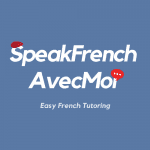How to ask questions in French?
How to ask questions in French? Today I will teach you the most simple way to ask a question in French
First, do no try to translate words for words from your own language. For example, maybe you speak English, and you think something like “ I know that to do is faire in French so I will start my question with faire, just as do you or does she… ‘ French grammar is different. How do you translate simple questions, like “ Do you have a blanket? “ or “ Can I have some water?’
In French we have many ways to ask the same question. Maybe this is the same in your own language. I will teach you the easiest way to ask questions.
First is to think if you are about to ask a a close-ended question or an open-ended question. A close-ended question is answered by yes, no, maybe, or I don’t know. An open-ended question is answered by sentences, an explanation, an opinion, etc. For example “ Can I have some water’ is a closed-ended question and “What do you have for lunch” is an open-ended question.
In French, a closed-ended question always starts with ‘Est-ce que’
Again, a closed-ended question always starts with ‘Est-ce que’ in French’. Est-ce que, the sound is eskuh, eskuh.
Now we know a question such as Can I have some water will start in French with ‘est-ce que’
An open-ended question will always start with ‘Qu’est-ce que’ in French
An open-ended question will always start with ‘Qu’est-ce que’ in French, Keskuh, Keskuh, keskuh with a k sound at the start. Now, we know that a question such as ’What do you have for lunch” will start with ‘Qu’est-ce que…’
Second, After ‘est-ce que’ ou ‘qu’est-ce-que’, the sentence order in French is subject+verb+complement. This means that you keep the order the same as a declarative sentence. To ask a question, you use ‘est-ce que’ or ‘qu’est-ce que’, +subject+verb+complement.
I know you are a beginner and you may not have enough French knowledge but let’s practice!
Practice
How to translate ‘Can I have some water’ ?
This is a closed ended question, in French, you question will start with ‘est-ce que’ and then subject+verb+complement. I is the subject, can is the verb, have some water is the complement. I can is je peux, have is avoir, and some water is de l’eau. Can I have some water is Est-ce que je peux avoir de l’eau?
How to translate ‘Do you have a blanket?
This a closed ended question, you start with ‘est-ce que’ then subject+verb+complement. You is the subject, have is the verb, and blanket is the complement. You have is vous avez, and a is ‘une’ because blanket is feminine, blanket is couverture. Let’s put it together Do you have a blanket is ‘est-ce que vous avez une couverture?’ In French.
Again, closed ended question in French start with est-ce que then subject+verb+complement.
How to translate, what do you have for lunch?
This is an open-ended question, you start with Qu’est-ce que’ then subject+verb+complement. You is subject, have is the verb, and for lunch is the complement. We just learned that you is vous, have is avez, and for lunch will translate into ‘pour le déjeuner’. What do you have for lunch? Is Qu’est-ce que vous avez pour le déjeuner’
Open ended question in French start with qu’est-ce que then subject+verb+complement.
Of course, you have to practice at home. Think if you will start your question by est-ce que or qu’est-ce que in French… You should also strive to learn 20 to 40 French words per week such as verbs, nouns, or adjectives.
BTW, ‘est-ce que’ means ‘is this that’ and ‘Qu’est-ce que’ is ‘what is this that’…as you can read, nothing to do with English.
Merci et à bientôt,
Séverine
